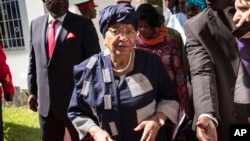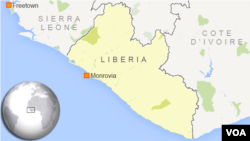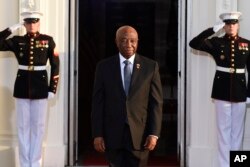Liberia is about a month away from what many hope will be the country’s first peaceful, democratic handover of power in decades.
President Ellen Johnson Sirleaf has led the country since the elections in 2005, after the second civil war, but her legally mandated two terms are up.
Twenty candidates from 26 different parties are running to replace her. They have been facing off in a series of public debates, a first for Liberia.
A leading opposition candidate is former Coca Cola executive Alexander Cummings.
“If you keep doing the same things, you will not get different results," notes Cummings, "the other fundamental truth is that the best predictor of future performance and future behavior is past performance and past behavior. And as Liberians go to the polls on October 10th, I ask you to keep those two truths in mind.”
Sirleaf has garnered international praise for stabilizing the war-ravaged country, but her Unity Party administration has been dogged by allegations of corruption.
Slogans like “Change for Hope,” Real Change, for Liberia” and “Change is Coming,” are plastered on campaign flyers all over Monrovia.
To reach young voters, the Alternative National Congress candidate has enlisted Hipco music artists, most notably Takun J, an outspoken critic of the current government.
“They lied to us. The government betray us," the artist sings.
But Vice President Joseph Boakai is among the front-runners. The ruling party candidate has made infrastructure the cornerstone of his campaign.
“When people ask me what are the priorities of this country I say to them, number one roads, number two roads, number three roads," he said. "There is no way we are going to expand the economy of this country when it is locked in.”
Other well-known faces leading the pack include the football star and senator, George Weah.
Weah lost to Sirleaf in the 2005 run-off election.
“Make no mistake, we will not sit idly and allow our democratic rights to be infringed upon," Weah warned, "which will produce a leader that was not elected by the people, but elected by a few ... your sacrifices will not be in vain. We seek nothing but a first round victory.”
But some voters say they are overwhelmed by all the choices or simply do not care.
“I am still searching, I have not found somebody yet," Judy Degonteh Williams told VOA.
“We Liberians, we were hoping that the UP-led government would liberate us from the hands of poverty ... but the UP government failed us," opined Maxine B. Kennedy.
“I do not have nobody on my mind for presidency ... I do not trust anyone,” confided Mercy Angeline Green.
Thomas Du of the Liberia office of the U.S.-based National Democratic Institute sees frustration among voters.
“When people are elected, they do not tend to keep a relationship with their constituents," he noted. "With that, the constituents are trying to interpret that to mean that you only see me as important for my vote.”
That disconnect is not helped by the fact an estimated 64 percent of Liberians live below the poverty line.
Nelly Cooper is the president of the West Point Women Health and Development Organization, which played a key role in community response efforts during the regional Ebola epidemic, a crisis that laid bare the weakness of Liberia’s public health system.
She says the candidates need to be more specific about their agendas.
“What are they going to do for Liberia? What are they going to do for me? What are they going to do for my children?” Cooper asked.
But amid the wealth of candidates, you can see one aspect of Sirleaf’s legacy as Africa’s first female president. An unprecedented number of Liberian women are running for political office this year, including one female presidential candidate, six women running for vice president and a record or almost 160 women are seeking seats in the legislature.






